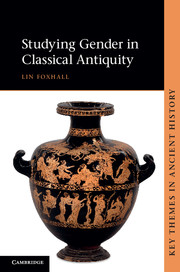Book contents
Chapter 2 - Households
Published online by Cambridge University Press: 05 May 2013
Summary
HOUSEHOLD AND FAMILY
Households and families were the core institutions that, in most ancient societies, served as the prime social arenas where gender relations were both constituted and acted out. Although the terms ‘household’ and ‘family’ did not signify quite what they do for us, they were highly meaningful concepts in the classical world.
Households in Greece
The most important Greek words for household were oikos and oikia, both meaning ‘house’ in several senses, including: 1) the physical structure, a building; 2) a family or lineage (as in English usage, e.g. ‘House of Windsor’); 3) an estate or property; or 4) almost all of the above at once, a household. The adjectival form, oikeios, means ‘related’, but can also mean ‘private’, highlighting the significance of the household as the realm of private life in contrast to civic and communal activity.
Oikos / oikia are the terms closest to our word ‘family’ in the sense in which it is most commonly used in English (i.e. as ‘nuclear family’), but the oikos often included a wider range of people. Other words were used for broader notions of kinship. The term genos (with its numerous derivatives) was a more general word, referring to a family or lineage of any size, extent or time depth. In classical Athens and to some extent elsewhere it also took on an ‘official’ meaning as ‘kindred’ or ‘clan’, constructed for the most part along the male line. The term angchisteia is also an ‘official’ word in Athens referring to an individual’s bilateral legal kindred, i.e. reckoning relatedness to a limited extent from both the father’s and the mother’s side (see Chapter 3, section 2). Within the angchisteia an individual owed and was owed specific legal and customary obligations and duties. In our sources and perhaps in practice, the angchisteia was most relevant to men, but female links were often crucial (Foxhall 1989 ; MacDowell 1989 ; Todd 1993: 204–10).
- Type
- Chapter
- Information
- Studying Gender in Classical Antiquity , pp. 24 - 44Publisher: Cambridge University PressPrint publication year: 2013
- 1
- Cited by

